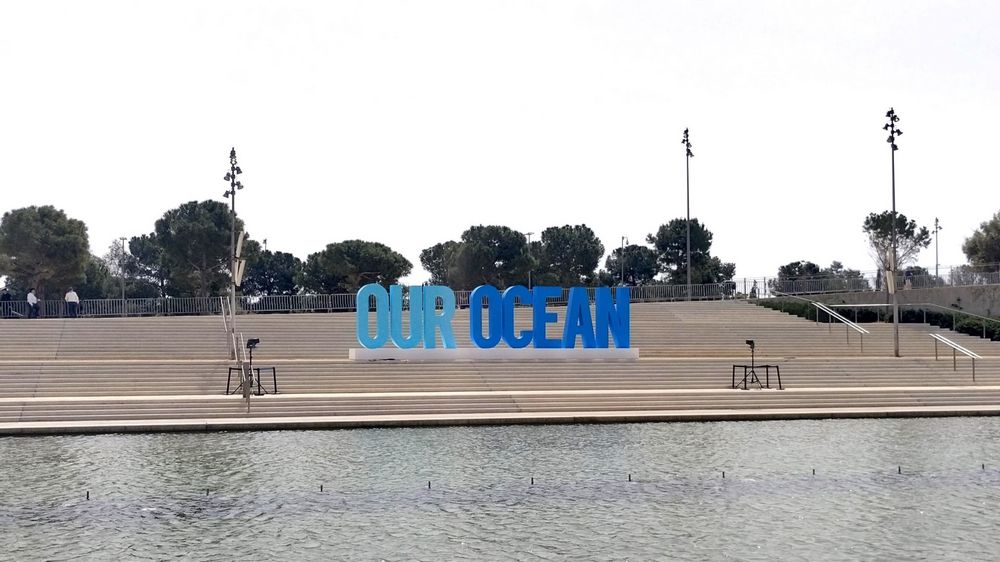Source-to-sea management is an approach that assists in balancing social, environmental, and economic priorities by recognizing the linkages between land, freshwater, coastal and marine ecosystems, and bringing together upstream and downstream stakeholders across sectors to collaborate on managing healthy ecosystems.
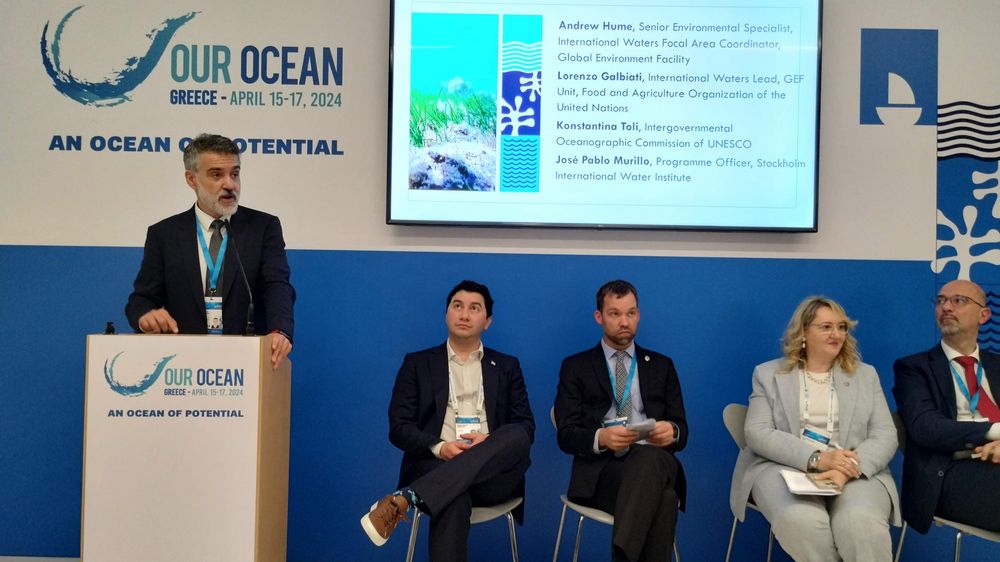
This event discussed opportunities and challenges to increase the political and financial investment in holistic source-to-sea management to address marine pollution caused by land-based sources, especially nutrient pollution that lead to extensive marine zones suffering from hypoxia. This event bridged the 2024 Our Ocean Conference with the UN 2023 Water Conference building on the outcomes and recommendations of the side event “Source-to-sea collaboration: A game changer for the whole water cycle” organised during the UN Water Conference in 2023 by a group of countries and stakeholders under the leadership of the Hellenic Ministry of Environment and Energy.
The side event presented two new global initiatives built on wide-reaching partnerships with the ability to bring about transformative change in Source to sea action, the GEF Clean and Healthy Ocean Integrated Program (CHO-IP), and the Healthy Rivers Healthy Oceans Programme.
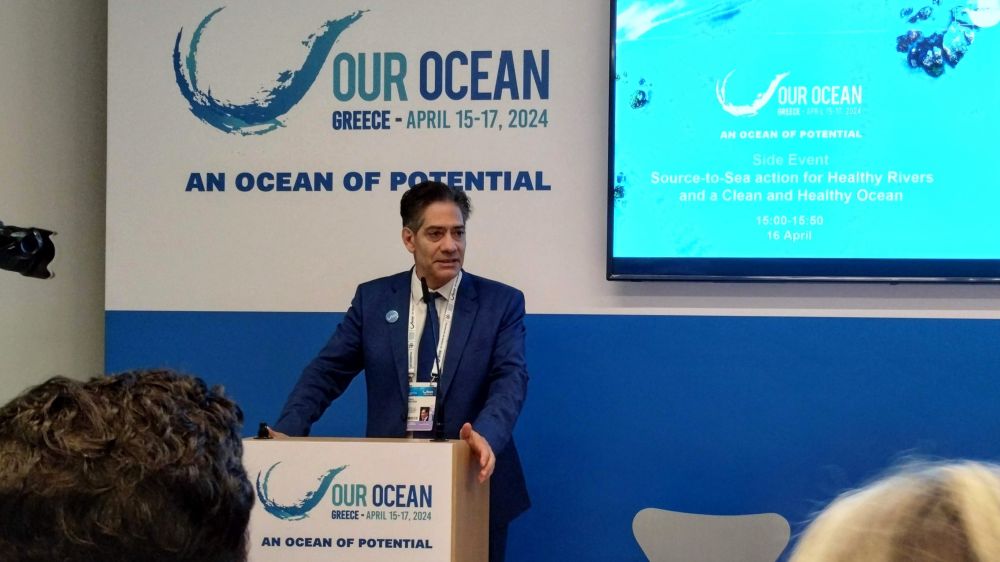
Petros Varelidis, Secretary General of Natural Environment and Waters, Hellenic Ministry of Environment and Energy, introduced the side-event, reaffirming Greece's commitment on tackling Source-to-sea challenges in an integrated manner. Recognising the dramatic degradation of many marine ecosystems, he also stressed that we have also see how quickly nature can recover when the right measures are put in place, such as effective treatment of wastewater before discharge into the sea.
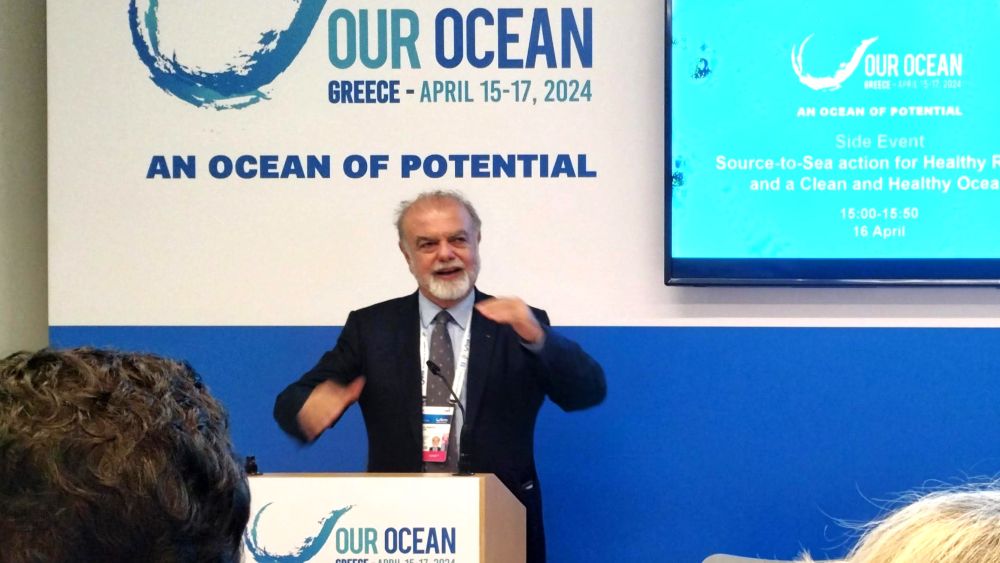
Professor Michael Scoullos, Global Water Partnership-Mediterranean (GWP-Med) Chair, explained the threat of ocean oxygen depletion (hypoxia), which is directly linked to the warming of the seas from climate change, and compounded by pollution from diffuse sources. He stressed that this multidimensional challenge, involving many different economic sectors, highlights the need to move into systems thinking in management, including the use of Source-to-Sea and Water-Energy-Food-Ecosystems Nexus as means to implement IWRM, and to provide lasting solutions.
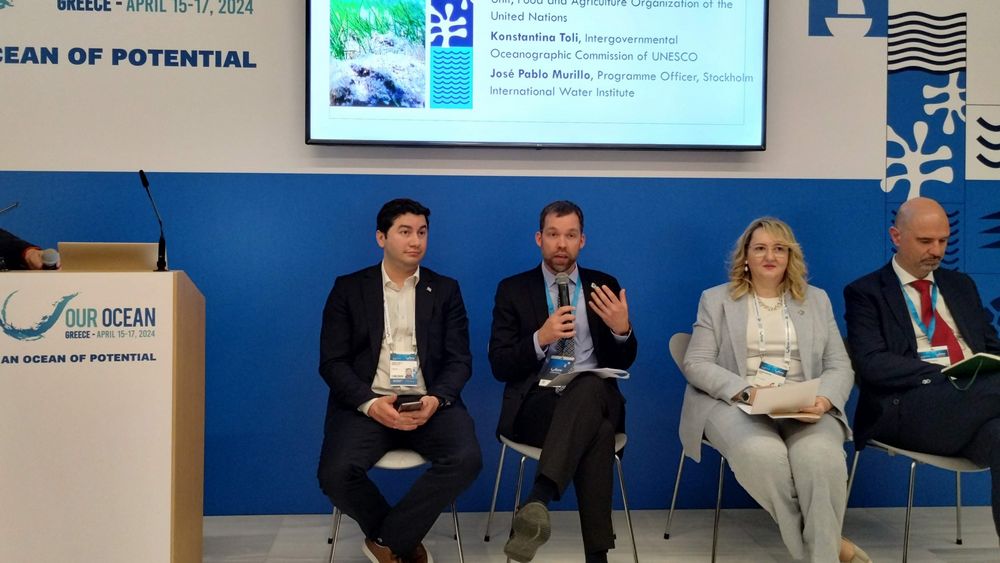
Andrew Hume, Senior Environmental Specialist, International Waters Focal Area Coordinator, Global Environment Facility, announced the GEF’s $100m+ grant commitment to curb coastal zone pollution & reduce ocean hypoxia (oxygen depletion), which is giving life to the Clean & Healthy Ocean programme. He stressed the importance of the programme in raising awareness about the growing challenge of hypoxia (oxygen depletion in the oceans), which in spite of the grave risks it poses, has so far not received the attention it deserves. The programme intends to create catalytic outcomes; the resources to be invested and partnerships to be established to fight pollution streams that cause hypoxia will form the critical mass for action to address source-to-sea pollution.
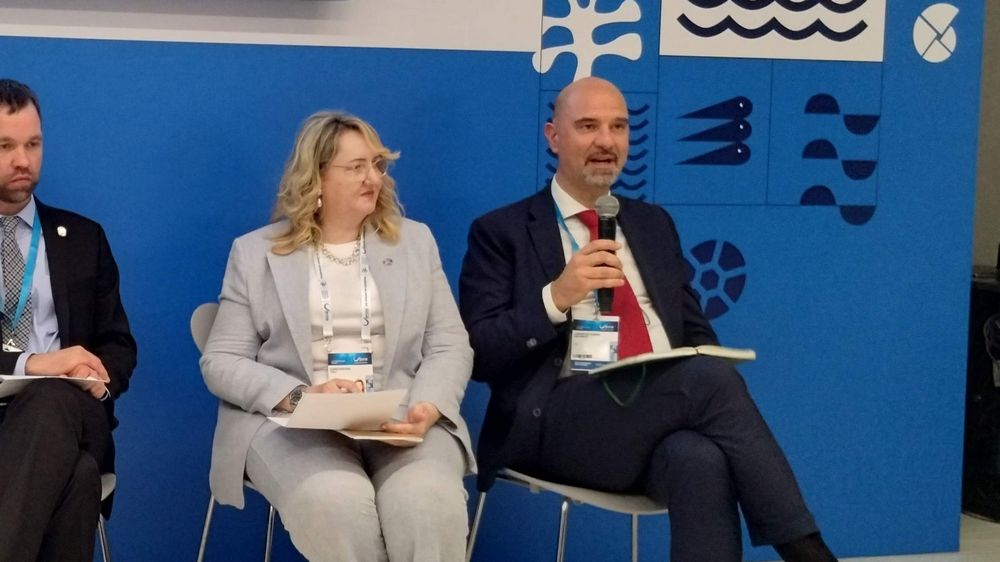
Lorenzo Galbiati, International Waters Lead, GEF Unit, Food and Agriculture Organization of the United Nations, stressed that the evidence is unequivocal about the urgent need for action for the oceans: from approximately 10 ‘dead zones’ in the 1970s (areas with no oxygen and therefore no longer able to support marine life), in 2020 there were about 400 to 500 dead zones. He explained the structure and specific goals of the Clean & Healthy Ocean Programme, which is led by FAO, involving a large coalition of partners: the EBRD, Asian Development bank and Latin American Development bank are involved to facilitate private sector investment and innovation which is necessary to transform the agricultural and waste management sectors; IOC UNESCO will support the development of science based strategic and adaptive approaches; while GWP will exploit its vast stakeholder network to establish source-to-sea partnerships that will work for achieving and sustaining results.
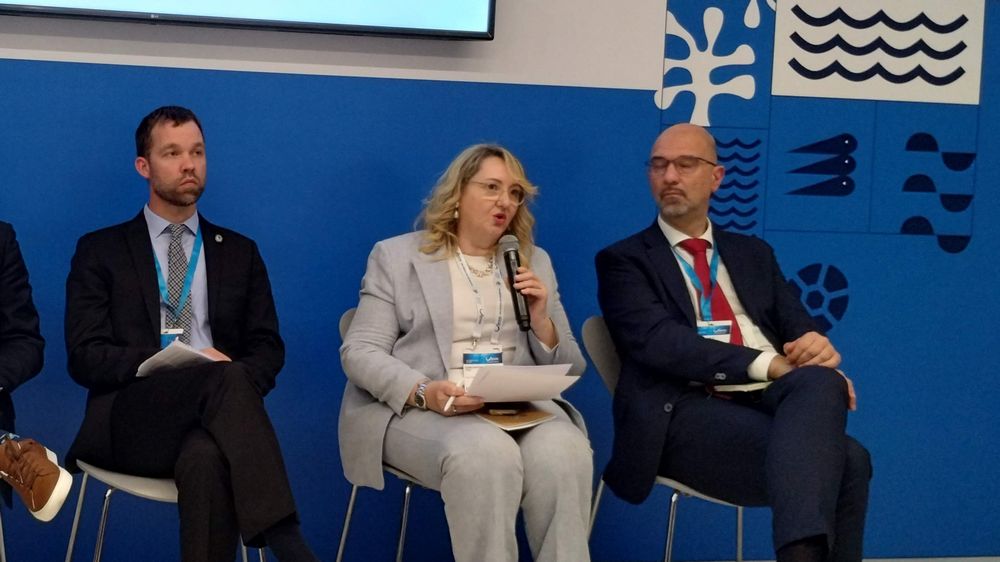
Konstantina Toli, Project Coordinator, Intergovernmental Oceanographic Commission of UNESCO, explained how IOC UNESCO will contribute through breaking new ground in scientific knowledge. Panelists agreed that although there is enough knowledge at the moment to unequivocally support the urgency of action, further knowledge is needed to ensure that actions taken will be as effective as possible.
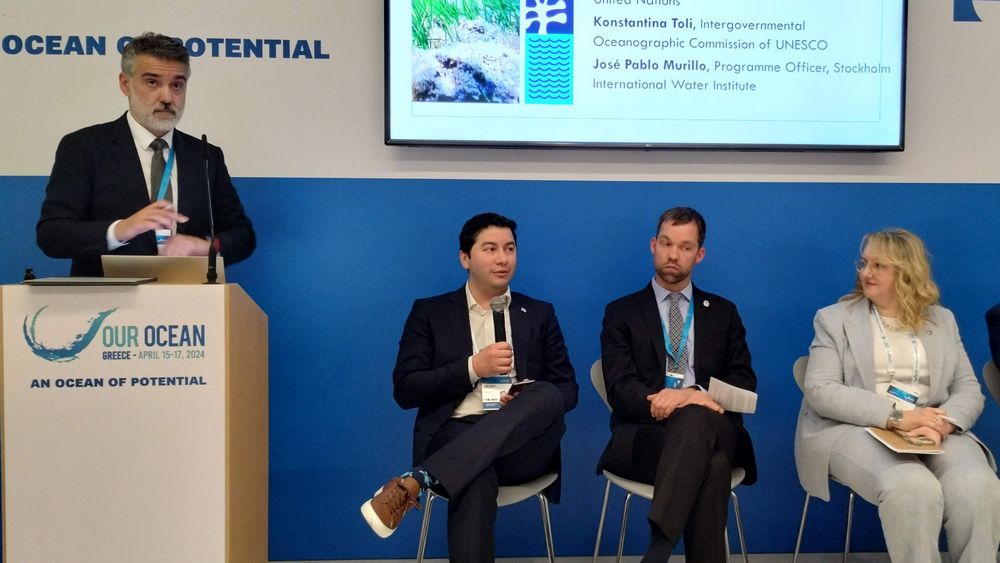
Jose Pablo Murillo from SIWI - Stockholm International Water Institute presented the 'Healthy Rivers Healthy Ocean Programme' coordinated by GWP, SIWI and IOC UNESCO and endorsed under the UN Water Action Agenda & the UN Ocean Decade, which will advance an integrated response towards sustainable natural resources management from source to sea, and for the achievement of SDG 6 and SDG 14. He stressed that the programme specifically aims to develop and implement systemic actions to break down silos between the freshwater and marine scientific communities, which currently often speak ‘different languages’, and use different terminologies to study similar phenomena, such as the flow of pollutants. The programme will provide a much needed space to share knowledge, build synergies and accelerate integrated action along common lines.
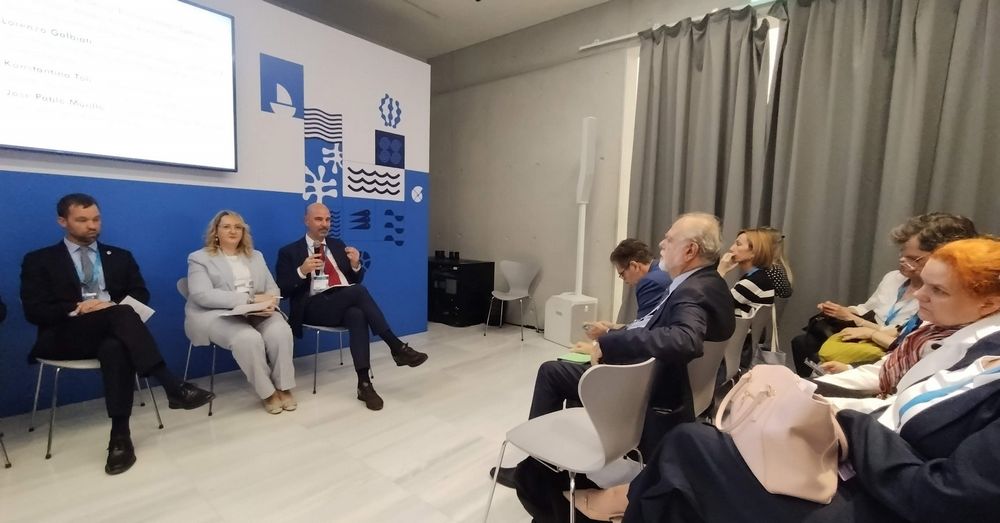
_________________________
About the Clean and Healthy Ocean Integrated Programme (CHO-IP):
The Clean and Healthy Ocean Integrated Programme (CHO-IP) is a global initiative to address the growing threat of marine hypoxia. Working from the source -in land systems where the causes of marine pressures lie- to the sea, the Programme aims to reduce nutrient pollution, restore degraded ecosystems, and promote sustainable practices to protect our oceans. With about USD 110.000.000 in GEF funding and USD 748.000.000 of associated co-financing, the CHO-IP represents a strong commitment by its Partners to address marine nutrient pollution and hypoxia.
Read more about the Clean and Healthy Ocean Integrated Programme (CHO-IP).
About the Healthy Rivers Healthy Oceans Programme:
Global Water Partnership (GWP), UNESCO’s Intergovernmental Oceanographic Commission (IOC-UNESCO) and the Stockholm International Water Institute (SIWI) commit to implementing the Healthy Rivers Healthy Oceans Program, which has been endorsed as a formal contribution to the UN Decade of Ocean Science for Sustainable Development. The programme, which will run from 2023 to 2030, will implement science, governance and technological solutions that consider the interdependencies between land, freshwater, coastal, and ocean systems, to advance the achievement of the freshwater- and ocean-related SDGs, notably SDG6 and SDG14.
Read more on GWP's website and UN's website.
